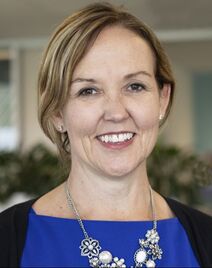 Deanne Fishburn Deanne Fishburn
Almost every year, questions are raised about the quality of graduate teachers in Queensland as universities reveal their Overall Position (OP) cut-offs for teacher education courses.
This year, the cut-offs range from OP4 to OP17. There is often an intense public focus on the lowest of all the rankings. How can we be satisfied we are getting a quality graduate teacher from a student who achieved an OP17? What is missing from the public debate, and which completely changes the picture of what is happening in Queensland, is an understanding of the extensive requirements education students must meet to first graduate and then become a registered teacher. Concentrating on OPs, and on high school graduates, also distorts the real picture of what the beginning teacher workforce looks like in Queensland. Fewer than one-third of teacher education students are high school graduates whose university acceptance is based on an OP. A high proportion of teaching graduates today already have another degree or career behind them. They are bringing invaluable experience into Queensland classrooms. Figures from the Queensland College of Teachers (QCT), which ensures university graduates meet required standards before they’re registered, show the average age of graduate teachers is now 28 years in Queensland. All teacher education students must have passed Senior English and Mathematics―and Science if they wish to study Early Childhood or Primary Education. High school graduates, unlike many of their peers applying for other courses at university, must submit a personal essay explaining their motivation and why they think they would make a good teacher. The essay also highlights qualities that are vital in a classroom that might not be highlighted in a school subject―empathy, adaptability, resilience, a passion to make a difference and service orientation. At all times, we want the best teachers for our students. Therefore, anyone who is accepted into an education course must complete extensive professional experience during their degree and a challenging final teaching performance assessment (the TPA). The TPA is then moderated across universities to ensure graduates meet the same high standards state-wide before they’re registered. Teacher education students must also sit a national test to ensure their literacy and numeracy skills are in the top 30 per cent of the Australian population. If they don’t pass, they don’t graduate. Only then are university graduates who apply for teacher registration assessed by the QCT as to whether they are suitable to be registered teachers. In this final step, they face a further examination of their teacher education qualifications and conduct, and criminal history and English language proficiency checks. Clearly, you can’t be registered as a teacher in Queensland without meeting high and rigorous standards. Whatever measures are used for entry into teacher education degrees, the key to high quality graduates is that graduation and teacher registration requirements are rigorous and met―and they are. What matters is not what OP, or ATAR (Australian Tertiary Admission Rank), a student receives, but whether they meet the standards required of them before they graduate from university and become registered as a teacher. As a Queenslander, no matter what the OP cut-offs are for education degrees this year, you can be confident, given all of the above, that we have, and will continue to have, high quality graduate teachers in this state. Originally published by The Courier-Mail on Thursday 16 January 2020. |
-
Home
-
Teacher Stories
- Teaching graduates meet tough standards
- Rachel Downie
- The importance of teachers
- Marsden State High School has the answer to keeping beginning teachers in the classroom
- Exceptional support for early career teachers in Far North Queensland
- QBECT
- 2018 Awards >
- 2017 Awards >
- 2016 Awards >
- HAT and LT >
- OAM >
- Taryn Gollshewsky
- Vanuatu
- NAIDOC >
- QLD Day >
- ANZAC
- Anxiety and trauma―an expert’s advice
|
Queensland College of Teachers
Level 5, 601 Coronation Drive Toowong Qld 4066 Call (07) 3377 4777 Search the QCT Teacher Stories website
|
|
